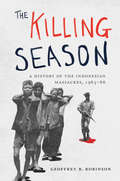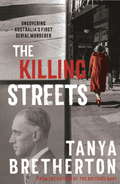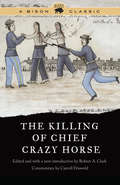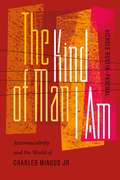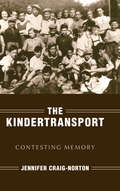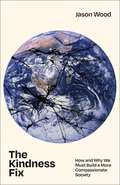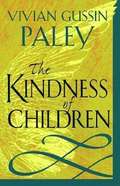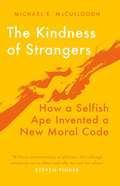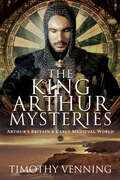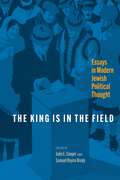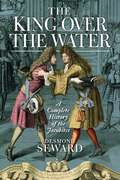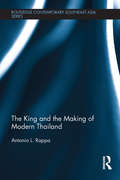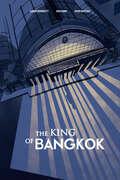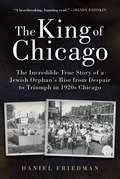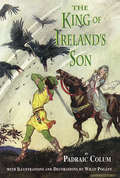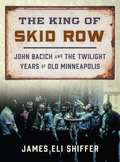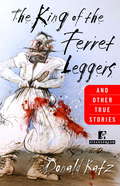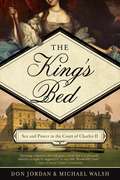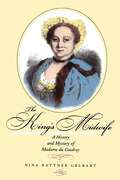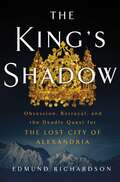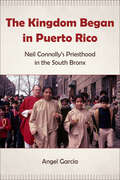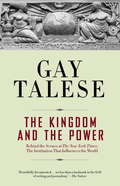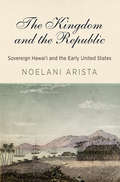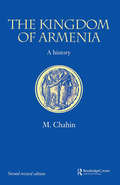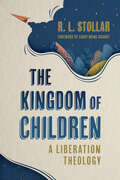- Table View
- List View
The Killing Season: A History of the Indonesian Massacres, 1965-66
by Geoffrey B. RobinsonThe Killing Season explores one of the largest and swiftest, yet least examined, instances of mass killing and incarceration in the twentieth century—the shocking antileftist purge that gripped Indonesia in 1965–66, leaving some five hundred thousand people dead and more than a million others in detention.An expert in modern Indonesian history, genocide, and human rights, Geoffrey Robinson sets out to account for this violence and to end the troubling silence surrounding it. In doing so, he sheds new light on broad and enduring historical questions. How do we account for instances of systematic mass killing and detention? Why are some of these crimes remembered and punished, while others are forgotten? What are the social and political ramifications of such acts and such silence?Challenging conventional narratives of the mass violence of 1965–66 as arising spontaneously from religious and social conflicts, Robinson argues convincingly that it was instead the product of a deliberate campaign, led by the Indonesian Army. He also details the critical role played by the United States, Britain, and other major powers in facilitating mass murder and incarceration. Robinson concludes by probing the disturbing long-term consequences of the violence for millions of survivors and Indonesian society as a whole.Based on a rich body of primary and secondary sources, The Killing Season is the definitive account of a pivotal period in Indonesian history. It also makes a powerful contribution to wider debates about the dynamics and legacies of mass killing, incarceration, and genocide.
The Killing Streets: Uncovering Australia's first serial murderer
by Tanya Bretherton**WINNER OF THE 2020 DANGER PRIZE**From the acclaimed author of THE SUITCASE BABY and THE SUICIDE BRIDE, the fascinating story of a series of horrific murders that began in 1930s Sydney - and a killer who remained at large for over two decades.In December 1932, as the Depression tightened its grip, the body of a woman was found in Queens Park, Sydney. It was a popular park. There were houses in plain view. Yet this woman had been violently murdered without anyone noticing. Other equally brutal and shocking murders of women in public places were to follow. Australia's first serial killer was at large.Police failed to notice the similarities between the victims until the death of one young woman - an aspiring Olympic swimmer - made the whole city take notice. On scant evidence, the unassuming Eric Craig was arrested. But the killings didn't stop... A compelling story of a city crippled by fear and what happens when victims are blamed and suspects are presumed guilty, The Killing Streetsinvestigates how a murderer could remain free to kill again.**Includes a BONUS extract from Tanya Bretherton's compelling new book THE HUSBAND POISONER**
The Killing of Chief Crazy Horse, Bison Classic Edition
by Robert A. ClarkThe Killing of Chief Crazy Horse is a story of envy, greed, and treachery. In the year after the Battle of the Little Big Horn, the great Oglala Sioux chief Crazy Horse and his half-starved followers finally surrendered to the U.S. Army near Camp Robinson, Nebraska. Chiefs who had already surrendered resented the favors he received in doing so. When the army asked for his help rounding up the the Nez Percés, Crazy Horse’s reply was allegedly mistranslated by Frank Grouard, a scout for General George Crook. By August rumors had spread that Crazy Horse was planning another uprising. Tension continued to mount, and Crazy Horse was arrested at Fort Robinson on September 5. During a scuffle Crazy Horse was fatally wounded by a bayonet in front of several witnesses. Here the killing of Crazy Horse is viewed from three widely differing perspectives—that of Chief He Dog, the victim’s friend and lifelong companion; that of William Garnett, the guide and interpreter for Lieutenant William P. Clark, on special assignment to General Crook; and that of Valentine McGillycuddy, the medical officer who attended Crazy Horse in his last hours. Their eyewitness accounts, edited and introduced by Robert A. Clark, combine to give The Killing of Chief Crazy Horse all the starkness and horror of classical tragedy.
The Kind of Man I Am: Jazzmasculinity and the World of Charles Mingus Jr. (Music-culture Ser.)
by Nichole Rustin-PaschalNearly four decades after his death, Charles Mingus Jr. remains one of the least understood and most recognized jazz composers and musicians of our time. Mingus’s ideas about music, racial identity, and masculinity—as well as those of other individuals in his circle, like Celia Mingus, Hazel Scott, and Joni Mitchell—challenged jazz itself as a model of freedom, inclusion, creativity, and emotional expressivity. Drawing on archival records, published memoirs, and previously conducted interviews, The Kind of Man I Am uses Mingus as a lens through which to craft a gendered cultural history of postwar jazz culture. This book challenges the persisting narrative of Mingus as jazz’s “Angry Man” by examining the ways the language of emotion has been used in jazz as shorthand for competing ideas about masculinity, authenticity, performance, and authority.
The Kindertransport: Contesting Memory (Studies In Antisemitism Ser.)
by Jennifer Craig-NortonA timely study of the effects of family separation on child refugees, using newly discovered archival sources from the WWII era: “Highly recommended.” —ChoiceThe Kindertransport—an organized effort to extract children living under the threat of Nazism—lives in the popular memory as well as in literature as a straightforward act of rescue and salvation, but these celebratory accounts leave little room for a deeper, more complex analysis. This volume reveals that in fact many children experienced difficulties with settlement: they were treated inconsistently by refugee agencies, their parents had complicated reasons for giving them up, and their caregivers had a variety of motives for taking them in. Against the grain of many other narratives, Jennifer Craig-Norton emphasizes the use of newly discovered archival sources, which include the correspondence of refugee agencies, carers, Kinder and their parents, and juxtaposes this material with testimonial accounts to show readers a more nuanced and complete picture of the Kindertransport. In an era in which the family separation of refugees has commanded considerable attention, this book is a timely exploration of the effects of family separation as it was experienced by child refugees in the age of fascism.
The Kindness Fix: How and Why We Must Build a More Compassionate Society
by Jason WoodIf a measure of our humanity is how we treat the most vulnerable, our report card is bleak. Our politics is divided, people in need are too often treated with cruelty, and the systems we built to support others are creaking. Welfare too often fails, sometimes with tragic consequences. Yet, the help we give to others can be more effective, more accepted, and more just if we cultivate greater levels of compassion to put it at the heart of public life and potentially resolve these challenges. In this book, Jason Wood reviews the research and talks to experts from across the world to make the moving case for greater compassion in public life.
The Kindness of Children
by Vivian Gussin PaleyExploring children's impulsive goodness, Paley lets her listeners and storytellers take us down unexpected paths, where the meeting of story and real life make us wonder: Are children wiser about the nature of kindness than we think they are? The book brings together the moral life of the very young and the very old. Paley's journey takes us into the different worlds of urban London, Chicago, Oakland, and New York City, and to a close-knit small town in Michigan's Upper Peninsula.
The Kindness of Strangers: How a Selfish Ape Invented a New Moral Code
by Michael E. McCulloughWhy do we give a damn about strangers? Altruism is unique to the human species. It is also one of the great evolutionary puzzles, and we may be on the brink of solving it. It turns out that, over the last 12,000 years, we have become more and more altruistic. This is despite the fact that, the majority of the time, our minds are still breathtakingly indifferent to the welfare of others. In solving the enigma of generosity in a world of strangers, McCullough takes us on a sweeping history of society and science to warn that, if we are not careful, our instincts and sympathies have as much potential for harm as for good. The bad news is that we are not designed to be kind. The good news is that we can push ourselves to be kind anyway, together.
The King Arthur Mysteries: Arthur's Britain & Early Medieval World
by Timothy VenningAn up-to-date and comprehensive guide to the history of the Arthurian phenomenon - the imaginary and historical world of the great British warlord and one of the huge historical mysteries of early and medieval Britain. The Arthurian story, based on fact and fiction, is central to Britain's 'creation myth' and the concept of Britain's heroic past. This is a deeply researched and scholarly but essentially accessible history and analysis for general readers and specialists and based on an impressive array of sources including Romano-British, Anglo-Saxon, rare medieval English, French and German sources, and archaeology - essential for modern historical research in early history. Modern and contemporary historiography is covered including 'debunking' treatments. The study surveys King Arthur in fact and fiction, his family, knights, and the legends that have grown up around them and developed to the enduring interest from history, literature to TV and film.
The King Is in the Field: Essays in Modern Jewish Political Thought (Jewish Culture and Contexts)
by Julie E. Cooper and Samuel Hayim BrodyIf politics is about the state, can a stateless people be political? Until recently, scholars were fiercely divided regarding whether Jews engaged in politics, displayed political wisdom, or penned works of political thought over the two millennia when there was no Jewish state. But over the past few decades, the field of Jewish political thought has begun to examine the ways in which Jewish individuals and communal organizations behaved politically even in diaspora.The King Is in the Field centers writing from leading scholars that serves as an introduction to this exciting field, providing critical resources for anyone interested in thinking about politics both within and beyond the state. From kabbalistic theology to economic philanthropy, from race and nationalism in the U.S. to Israeli legal discourse and feminist activism, this key study of Jewish political thought holds the promise to reorient the field of political thought as a whole by expanding conceptions of what counts as “political.”In a world in which statelessness now applies to 100 million individuals, this volume illuminates ways to understand how diaspora Jewish political thought functioned in adopted homelands. This approach allows the book to offer questions and analysis that add depth and breadth to academic studies of Jewish politics while simultaneously offering a blueprint for future volumes interrogating political action through multiple diasporas.Contributors: Samuel Hayim Brody, Lihi Ben Shitrit, Julie E. Cooper, Arye Edrei, Meirav Jones, Rebecca Kobrin, Vincent Lloyd, Menachem Lorberbaum, Shaul Magid, Assaf Tamari, Irene Tucker, Philipp Von Wussow, Michael Walzer.
The King Over the Water: A Complete History of the Jacobites
by Desmond Seward&“An engaging look at the violent struggle of the surprisingly diverse Jacobites... Swift and cinematic with neatly sketched character portraits.&” —Financial Times This is the first modern history for general readers of the entire Jacobite movement in Scotland, England and Ireland, from the &‘Glorious Revolution&’ of 1688 that drove James II into exile to the death of his grandson, Cardinal Henry, Duke of York, in 1807. The Battle of Culloden and Bonnie Prince Charlie&’s flight through the heather are well known, but not the other risings and plots that involved half of Europe and even revolutionary America. Based on the latest research, The King over the Water weaves together all the strands of this gripping saga into a vivid, sweeping narrative, full of insight, analysis and anecdote. &“Few causes have aroused a more gallant response from the peoples of these islands than the Honest Cause,&” writes Desmond Seward, &“whether they were fighting for it at Killiecrankie, Prestonpans or Culloden, at the Boyne, Aughrim or Fontenoy, or dying for it on the scaffold.&” &“Highly readable, with brilliantly rendered characters, and thrilling tales of deceit and espionage.&”—Military History Monthly &“A bracingly revisionist history.&” —Telegraph &“Seward's detailed descriptions of the Princes, Princesses, Kings, and Queens create a sense of theatre and allow the reader to fully immerse themselves into the dramatic events of the period . . . an engaging and easy read.&” —Scottish Field &“A rollickingly, splendidly chronological history.&” –Herald &“Seward's clear-sighted examination of the Jacobite movement shows how close it came to succeeding.&” —Scotsman &“This lively book is a welcome addition.&” —BBC History
The King and the Making of Modern Thailand (Routledge Contemporary Southeast Asia Series)
by Antonio L. RappaThe making of modern Thailand is grounded in specific political institutions, Brahmanical tropes, and sacred Buddhist traditions stylized with Hindu rituals. Over and above these mysterious practices and ancient customs, modern Thailand is a product of the late Great Rama IX Bhumibol Adulyadej. Most Thai people have only known one King. Born in Europe and educated during World War II, Bhumibol was the son of a Harvard medical doctor who had a penchant for jazz music and fast cars. When he returned to Thailand in 1951 to assume his royal duties, he could hardly speak Thai but his French and German were remarkable. Bhumibol had inherited an impoverished country with nothing but a symbolic role as a figurehead monarch. He was surrounded by envious courtiers and royals from other families now sidelined by the rise of the Chakri. Scheming generals and authoritarian field marshals were emptying the Kingdom’s coffers. Using guile and wit, Bhumibol had turned the tide by 1973. He became the most powerful modern warlord in the history of the Kingdom. He survived attempted murder, crafty politicians, corrupt generals, sycophantic courtiers and impoverished masses. When he died on October 13 2016, Bhumibol was already the longest standing monarch in the world. King Bhumibol was deeply respected and well-liked by farang and locals alike. Despite his massive social and economic achievements many problems continue to plague the Kingdom. These are prostitution, human rights issues, pollution, corruption, cronyism in Chinese businesses, border conflicts with Cambodia, and the refugee problem. This book examines the role of Rama IX and the variegated set of problems that persist in life under the great white elephant and mango trees. Rappa draws from his primary research that includes interviews, surveys and first-hand observations of a remarkable kingdom and a uniquely remarkable king to reveal the internal security threats to democracy and civil society in the oldest Southeast Asian kingdom in late modernity.
The King of Bangkok (ethnoGRAPHIC)
by Claudio Sopranzetti Sara Fabbri Chiara NatalucciThe English translation of this best-selling graphic novel tells the story of Nok, an old blind man who sells lottery tickets in Bangkok, as he decides to leave the city and return to his native village. Through reflections on contemporary Bangkok and flashbacks to his past, Nok reconstructs a journey through the slums of migrant workers, the rice fields of Isaan, the tourist villages of Ko Pha Ngan, and the Red Shirt protests of 2010. Based on a decade of anthropological research, The King of Bangkok is a story of migration to the city, distant families in the countryside, economic development eroding the land, and violent political protest. Ultimately, it is a story about contemporary Thailand and how the waves of history lift, engulf, and crash against ordinary people.
The King of Chicago: Memories of My Father
by Daniel Friedman“More than a son’s paean to his father . . . An intergenerational portrait of the quintessential American Jewish family, a rags-to-riches story” (Ethan Michaeli, author of The Defender). The King of Chicago is the story of a father-son relationship as real and hugely loving as that in Philip Roth’s Patrimony. At its heart is a young son who tries furiously to heal his father from a violent childhood inside a Chicago orphanage. The orphanage, the Marks Nathan Home, still stands today on the West Side of Chicago, marked by a tarnished, barely legible plaque. Once home to fourteen thousand Jewish orphans, it is now just another barely remembered relic of a great city. Using original articles from the orphanage newspaper, Friedman attempts to reconstruct and understand his father’s childhood, a time that his father never discussed. Expanding its reach, The King of Chicago becomes a multigenerational saga of Jewish life, moving from a mysterious little man named Kasiel, who arrived in the Port of Baltimore in 1903 with two dollars to his name, to the factory floor of a scrap paper business, a golf course where children played without knowing the rules, and a home on the North Shore among fellow immigrants looking for something better for their children. At its core, this memoir is both a snapshot of immigrant life in Chicago in the early twentieth century and a poignant reminder about the need to never forget who you are and where you come from.
The King of Ireland's Son
by Padraic ColumCompiled by noted Irish author Padraic Colum, this treasury of time-honored tales from the fairy-haunted folklore of the Emerald Isle includes these favorite stories: "Fedelma, the Enchanter's Daughter," "When the King of the Cats Came to King Connal's Dominion," "The Sword of Light and the Unique Tale," "The Town of the Red Castle," "The King of the Land of Mist," "The House of Crom Duv," and "The Spae-Woman."Brimming with sly humor, whimsy and imagination, these delightful tales offer hours of enjoyable reading. Nine full-page illustrations and numerous other decorations by Willy Pogány further enhance the text with a mood of timeless enchantment.
The King of Skid Row: John Bacich and the Twilight Years of Old Minneapolis
by James Eli ShifferThe story of a much different Minneapolis, through the words and photographs of one of its most colorful characters—now in paperback City blue laws drove the liquor trade and its customers—hard-drinking lumberjacks, pensioners, farmhands, and railroad workers—into the oldest quarter of Minneapolis. In the fifty-cent-a-night flophouses of the city&’s Gateway District, they slept in cubicles with ceilings of chicken wire. In rescue missions, preachers and nuns tried to save their souls. Sociology researchers posing as vagrants studied them. And in their midst John Bacich, aka Johnny Rex, who owned a bar, a liquor store, and a cage hotel, documented the gritty neighborhood&’s last days through photographs and film of his clientele. The King of Skid Row follows Johnny Rex into this vanished world that once thrived in the heart of Minneapolis. Drawing on hours of interviews conducted in the three years before Bacich&’s death in 2012, James Eli Shiffer brings to life the eccentric characters and strange events of an American skid row. Supplemented with archival and newspaper research and his own photographs, Bacich&’s stories recreate the violent, alcohol-soaked history of a city best known for its clean, progressive self-image. His life captures the seamy, richly colorful side of the city swept away by a massive urban renewal project in the early 1960s and gives us, in a glimpse of those bygone days, one of Minneapolis&’s most intriguing figures—spinning some of its most enduring and enthralling tales.
The King of the Ferret Leggers and Other True Stories
by Donald KatzThe King of the Ferret Leggers and Other True Stories collects journalist Donald Katz's most fascinating profiles of people whose lives tell us something about business, adventure, sports, politics, culture, and in a brilliant, ancillary way, ourselves. Katz's opening story and the title piece of the book offers a hilarious yet appropriately reverential look at 72-year old Reg Mellor, unparalleled "ferret legging" champion of Yorkshire and the world. Other characters who populate this book include fitness guru Jack LaLanne, legendary entrepreneur Paul Hawken, and master political cartoonist and inspired troublemaker Bill Mauldin. While this collection contains portraits that are varied in scene and tone, their depictions of obsession, delusion, perseverance, creativity, and good-heartedness-the list could go on and on-remain a constant. Each of these stories conveys a sense of the strangeness, wonder, and oddity of life-a theme that provides a gravitational center to this multifarious selection drawn from twenty years of an award-winning non-fiction story-teller's body of work.
The King's Bed: Ambition and Intimacy in the Court of Charles II
by Michael Walsh Don JordanAn intelligent and spirited history of Charles II's dissolute life and surprising legacy, by two veteran historians. To refer to the private life of Charles II is to abuse the adjective. His personal life was anything but private. His amorous liaisons were largely conducted in royal palaces surrounded by friends, courtiers and literally hundreds of servants and soldiers. Gossip radiated throughout the kingdom. Charles spent most of his wealth and his intellect on gaining and keeping the company of women, from the lowest sections of society such as the actress Nell Gwyn to the aristocratic Louise de Kérouaille. Some of Charles' women played their part in the affairs of state, coloring the way the nation was run. The authors take us inside Charles' palace, where we will meet court favorites, amusing confidants, advisors jockeying for political power, mistresses past and present as well as key figures in his inner circle such as his 'pimpmasters' and his personal pox doctor. The astonishing private life of Charles II reveals much about the man he was and why he lived and ruled as he did. The King's Bed tells the compelling story of a king ruled by his passion.
The King's Midwife: A History and Mystery of Madame du Coudray
by Nina Rattner GelbartThis unorthodox biography explores the life of an extraordinary Enlightenment woman who, by sheer force of character, parlayed a skill in midwifery into a national institution. In 1759, in an effort to end infant mortality, Louis XV commissioned Madame Angélique Marguerite Le Boursier du Coudray to travel throughout France teaching the art of childbirth to illiterate peasant women. For the next thirty years, this royal emissary taught in nearly forty cities and reached an estimated ten thousand students. She wrote a textbook and invented a life-sized obstetrical mannequin for her demonstrations. She contributed significantly to France's demographic upswing after 1760.Who was the woman, both the private self and the pseudonymous public celebrity? Nina Rattner Gelbart reconstructs Madame du Coudray's astonishing mission through extensive research in the hundreds of letters by, to, and about her in provincial archives throughout France. Tracing her subject's footsteps around the country, Gelbart chronicles du Coudray's battles with finance ministers, village matrons, local administrators, and recalcitrant physicians, her rises in power and falls from grace, and her death at the height of the Reign of Terror. At a deeper level, Gelbart recaptures du Coudray's interior journey as well, by questioning and dismantling the neat paper trail that the great midwife so carefully left behind. Delightfully written, this tale of a fascinating life at the end of the French Old Regime sheds new light on the histories of medicine, gender, society, politics, and culture.
The King's Shadow: Obsession, Betrayal, and the Deadly Quest for the Lost City of Alexandria
by Edmund RichardsonImpeccably researched, and written like a thriller, Edmund Richardson's The King's Shadow is the extraordinary untold and wild journey of Charles Masson - think Butch Cassidy and the Sundance Kid meets Indiana Jones - and his search for the Lost City of Alexandria in the "Wild East" during the age of empires, kings, and spies. For centuries the city of Alexandria Beneath the Mountains was a meeting point of East and West. Then it vanished. In 1833 it was discovered in Afghanistan by the unlikeliest person imaginable: Charles Masson, deserter, pilgrim, doctor, archaeologist, spy, one of the most respected scholars in Asia, and the greatest of nineteenth-century travelers.On the way into one of history's most extraordinary stories, he would take tea with kings, travel with holy men and become the master of a hundred disguises; he would see things no westerner had glimpsed before and few have glimpsed since. He would spy for the East India Company and be suspected of spying for Russia at the same time, for this was the era of the Great Game, when imperial powers confronted each other in these staggeringly beautiful lands. Masson discovered tens of thousands of pieces of Afghan history, including the 2,000-year-old Bimaran golden casket, which has upon it the earliest known face of the Buddha. He would be offered his own kingdom; he would change the world, and the world would destroy him.This is a wild journey through nineteenth-century India and Afghanistan, with impeccably researched storytelling that shows us a world of espionage and dreamers, ne'er-do-wells and opportunists, extreme violence both personal and military, and boundless hope. At the edge of empire, amid the deserts and the mountains, it is the story of an obsession passed down the centuries.
The Kingdom Began in Puerto Rico: Neil Connolly's Priesthood in the South Bronx
by Angel Garcia&“A story of how a priest struggled to live the call of the Second Vatican Council, and . . . worked alongside laypeople for social justice in the Bronx.&” ―National Catholic Reporter South Bronx, 1958. Change was coming. It was a unique place and time in history where Father Neil Connolly found his true calling and spiritual awakening. Set in the context of a changing world and a changing Catholic Church, The Kingdom Began in Puerto Rico follows Fr. Neil Connolly&’s path through the South Bronx, which began with a special Church program to address the postwar great Puerto Rican migration. After an immersion summer in Puerto Rico, Fr. Neil served the largest concentration of Puerto Ricans in the Bronx from the 1960s to the 1980s as they struggled for a decent life. Through the teachings of Vatican II, Connolly assumed responsibility for creating a new Church and world. In the war against drugs, poverty, and crime, he created a dynamic organization and chapel run by the people, and supported Unitas, a unique peer-driven mental health program for youth. Frustrated by the lack of institutional responses to his community&’s challenges, he challenged government abandonment and spoke out against ill-conceived public plans. Ultimately, he realized that his priestly mission was in developing new leaders among people, in the Church and the world, and supporting two pioneering lay leadership programs, the Pastoral Center and People for Change. Angel Garcia ably blends the dynamic forces of Church and world that transformed Fr. Connolly as he grew into his vocation. This book presents a rich history of the South Bronx and calls for all urban policies to begin with the people. It also affirms the continuing relevance of Vatican II and Medellin for today&’s Church and world, in the US and Latin America. &“Garcia captures the spirit of the era, and the spirit of the man.&” —James Martin, S.J., author of Jesus: A Pilgrimage
The Kingdom and the Power
by Gay TaleseThe classic inside story of The New York Times, the most prestigious, and perhaps the most powerful, of all American newspapers. Bestselling author Talese lays bare the secret internal intrigues behind the tradition of front page exposes in a story as gripping as a work of fiction and as immediate as today's headlines.From the Trade Paperback edition.
The Kingdom and the Republic: Sovereign Hawai'i and the Early United States (America in the Nineteenth Century)
by Noelani AristaIn 1823, as the first American missionaries arrived in Hawaiʻi, the archipelago was experiencing a profound transformation in its rule, as oral law that had been maintained for hundreds of years was in the process of becoming codified anew through the medium of writing. The arrival of sailors in pursuit of the lucrative sandalwood trade obliged the aliʻi (chiefs) of the islands to pronounce legal restrictions on foreigners' access to Hawaiian women. Assuming the new missionaries were the source of these rules, sailors attacked two mission stations, fracturing relations between merchants, missionaries, and sailors, while native rulers remained firmly in charge.In The Kingdom and the Republic, Noelani Arista (Kanaka Maoli) uncovers a trove of previously unused Hawaiian language documents to chronicle the story of Hawaiians' experience of encounter and colonialism in the nineteenth century. Through this research, she explores the political deliberations between aliʻi over the sale of a Hawaiian woman to a British ship captain in 1825 and the consequences of the attacks on the mission stations. The result is a heretofore untold story of native political formation, the creation of indigenous law, and the extension of chiefly rule over natives and foreigners alike.Relying on what is perhaps the largest archive of written indigenous language materials in North America, Arista argues that Hawaiian deliberations and actions in this period cannot be understood unless one takes into account Hawaiian understandings of the past—and the ways this knowledge of history was mobilized as a means to influence the present and secure a better future. In pursuing this history, The Kingdom and the Republic reconfigures familiar colonial histories of trade, proselytization, and negotiations over law and governance in Hawaiʻi.
The Kingdom of Armenia: New Edition (Caucasus World)
by Mack ChahinWhile the majority of contemporary works on Armenia concentrate on the modern era, The Kingdom of Armenia takes its beginning in the third century BC, with the ancient literate peoples of Mesopotamia who had commercial interests in the land of Armenia, and continues with a comprehensive overview through to the end of the Middle Ages.
The Kingdom of Children: A Liberation Theology
by R. L. StollarEmpower the children in your faith community. Children are marginalized in our churches, dismissed into Sunday school or silenced for lengthy sermons aimed at adults. R. L. Stollar has spent his career advocating for the rights of children, and he thinks it&’s time to stop talking down to children and start listening to them.In The Kingdom of Children, Stollar proposes a liberation theology of the child. Stollar begins with a theoretical framework that centers children in our theology and ecclesial life. Reframing biblical stories to center children, we can see how the binding of Isaac reflects the spiritual effects of child abuse, or how children like Miriam can serve as leaders in their communities. Using scriptural examples as well as real studies of children&’s spiritual lives, Stollar asserts that children can be priests, prophets, and theologians in our communities. Each chapter concludes with activities and discussion points for introducing the book&’s concepts to children.The Kingdom of Children is a must-read for youth ministers, parents, and anyone who works with children. By embracing the liberation of children, we can avoid stunting their spiritual growth and passing on trauma. And when we lift up children—truly value and learn from them—we build up the kingdom of God here in our communities.
